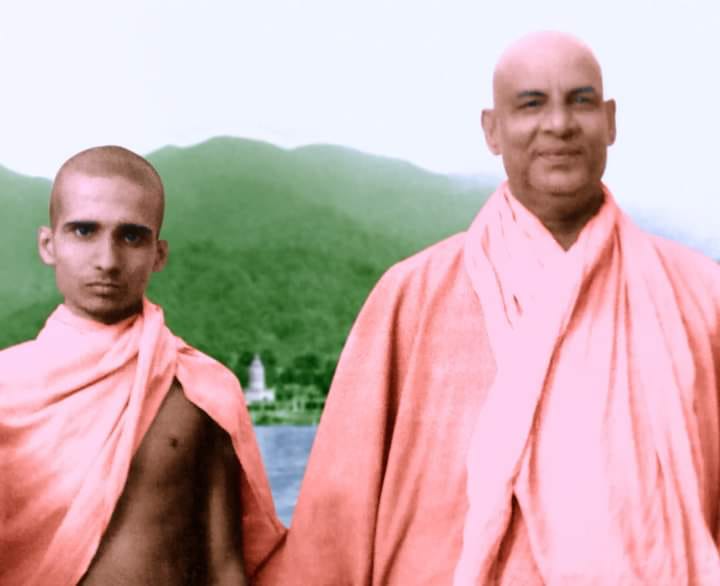The Moksha Gita: Swami Sivananda // Commentary: Chapter 10-3 : Swami Krishnananda.
Chinmaya International Foundation (CIF), research wing of Chinmaya Mission Worldwide.
Adi Sankara Nilayam, Veliyanad, Eranakulam, India, Kerala
welcometocif@chinfo.org
Chinmaya International Foundation (CIF)
Vibrant Onam celebrations at CIF 🌼🌸 ✨
Festivities began on ‘Atham’, with daily garden-fresh flower arrangements- pookkalams enthusiastically put together by the staff.
A special Onakkodi (new outfits) distribution for the entire staff on August 24 reinforced the feelings of togetherness and joy!
The celebrations picked up steam with the entire CIF family, along with students from the residential Puja Vidhanam Course, coming together on August 26 for a cultural showcase. Decorating of a beautiful pookkalam was followed by Thiruvathirakali dance and Ona Paattu songs by the staff.
The Puja Vidhanam Course and CVV students even enacted a beautiful musical on the Vamana and Mahabali story – depicting the origin of Onam. Everyone was so overwhelmed that they literally showered the Vaman Avatara with flowers and bowed down to Him.
This was followed by fun and games such as lemon-and-spoon race, tug-of-war, musical-chairs etc. Not only did this bringing out the sporty competitiveness in all but also rejuvenated the team spirit and bonding among all present. A sumptuous spread of traditional Ona-sadhya (feast) completed the festivities!
The celebrations concluded on Thiruvonam, with Swami Sharadananda leading a special puja for Lord Thrikkakarayappan. CIF's Onam celebration beautifully intertwined tradition, togetherness, and reverence, leaving cherished memories for all.
Onashamsakal!
==============================================================
================================================================
Thursday, 31 Aug 2023 07:30.
The Moksha Gita: Swami Sivananda
Chapter 10: The State of Jivanmukti-3.
Commentary: Swami Krishnananda.
================================================================
4.
"For a liberated sage who has realised that all being are the Self, there is neither delusion nor grief, as there is no second for him."
===============================================================
To him who sees Oneness only everywhere, where is delusion and where is grief? The experience of secondlessness is achieved through a finding of one's self in each and every being including even the wicked and the ungrateful. Such an expansion of the Self leads to the glory of the manifestation of the real Essence of the Being of all beings, where one finds himself in truth, where the lost Self is recovered with unbounded joy. Grief is only the temporary psychosis of the individual which has been deprived of a desired object or which is unable to fulfil a desire.
The Jivanmukta who sees the One common Being spread everywhere grieves never. Beholding Existence as undivided he walks on the earth unknown and unidentified. No one can find out whether such a person is a learned one or is ignorant, whether he is virtuous or vicious. He lives in the great silence of the Self, and whether active or at rest does not link his ego with his act. He does not see duality even when he is awake to the world. He is a representative of the Supreme Brahman, appearing before the human eyes.
The freed soul assumes the form of what is existent in the absolute point of view. Hence the sage becomes a Gunatita. He is alike in pleasure and pain, Self-abiding, regarding a clod of earth, a stone or gold alike. He is the same to the agreeable and to the disagreeable, firm and alike in censure and praise. Honour and disgrace do not make to him differences. Friend and foe are no more valid conceptions.
The Upanishad says, "Him who knows this (Brahman) these two do not overcome – neither the thought 'Therefore I did wrong,' nor the thought 'Therefore I did right.' Surely he overcomes both. He is not affected by either what he has done or what he has not done. He sees the Atman in the Atman. He sees everything as the Self. Evil does not overcome him; on the other hand he overcomes all evil. Evil does not burn him; on the other hand he burns all evil. One who knows Brahman becomes Brahman. He is fearless. He, who, on all beings, looks as his very Self, and on the Self as all beings – he does not shrink away from anything. If one would know It here, then there is the True End of all aspirations. He who knows That set in the secret place of the heart, he, here on earth, rends asunder the knot of ignorance.
"Of him whose desire is satisfied, who is a perfected soul, all desires even here on earth vanish away! He who knows Brahman attains the Highest. One who knows that Brahman exists is really existent. If one who knows this (Self) should offer the leavings even to an outcast (pariah), it would be offered in his Universal Atman. The Seer does not see death, nor sickness, nor any distress. The seer sees only the All, and obtains the All entirely. He has delight in the Self, he sports in the Self, he has company with the Self, he has bliss in the Self. He is autonomous. He has unlimited freedom in all the worlds.
"Of whatever object he becomes desirous, whatever desire he desires, merely out of his will it arises. One who realises 'I am Brahman' becomes the All. Even the gods have not got the power to prevent his becoming thus, for he becomes their very Self. He who is without desire, who is freed from desire, whose desire is satisfied, whose desire is the Self – his Pranas do not depart. They are gathered together right here. He being Brahman Itself, becomes Brahman.
"When one realises (the Eternal), all has been done. Only by knowing Him does one pass beyond death. There is no other way for going over there."
*****
To be continued
================================================================














Comments